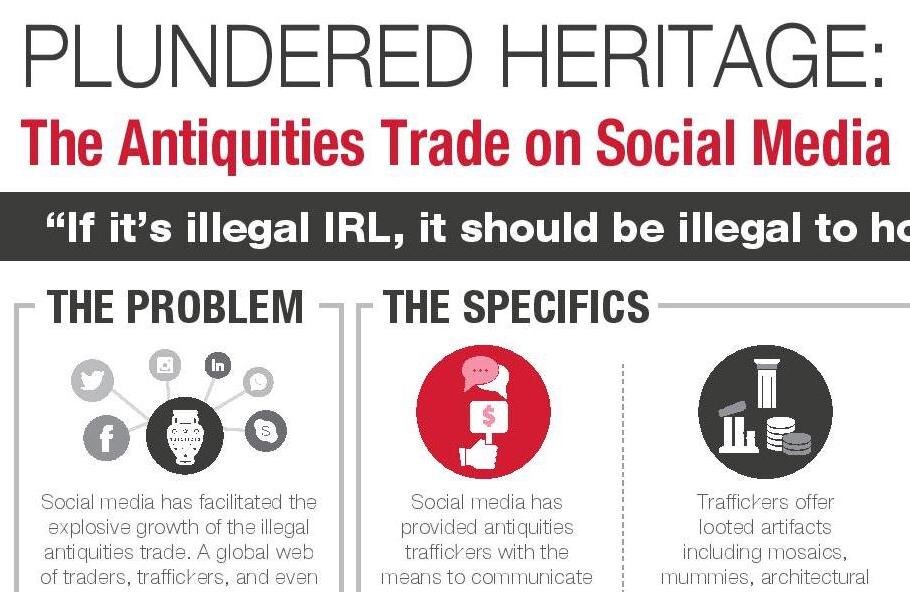Looted Antiquities Trafficking
Social media has facilitated the explosive growth of the illegal antiquities trade. A global web of traders, traffickers and even terrorists use these platforms to buy and sell looted antiquities. Download the fact sheet.
The Islamic State turned the social platform into a global marketplace for stolen relics—until a group of vigilante archaeologists took matters into their own hands. Read The Atlantic Article.
An ancient Egyptian cat statue was recently repatriated. How the cat statue was obtained is unclear, but it is known that it was illegally smuggled. Egyptian officials estimate that tens of thousands of antiquities have been smuggled out of the country in recent years. Shawn Graham, an ACCO Founding member, notes that social media websites like Facebook and Instagram have "super-charged" efforts to sell and obtain stolen items. Read the article.
Facebook's new policy of banning the sale of historical artifacts is a welcome first step. But of their moderation strategy of deleting any content that violates their Community Standards also means that crucial evidence of war crimes is destroyed. Read more in the Foreign Affairs article.
The company announced the prohibition after researchers reported that looters were using the platform to identify and sell illegally excavated antiquities. Read the New York Times article.
Facebook has banned users trading in historical artefacts on the site. It follows a campaign by academic researchers and an investigation by BBC News, exposing how items looted from Iraq and Syria were sold on Facebook.
Podcast by the BBC on Amr Al-Azm, who set up a network of frontline archaeologists - some of them former students and colleagues - that have been risking their lives to protect what remains of Syria's cultural heritage. Listen to the podcast.
Amr Al-Azm and Katie Paul investigate how Facebook’s rapid growth and lack of internal policing mechanisms over the past decade have helped the platform become a digital black market where users buy and sell goods, including illicit antiquities, from some of the world’s most conflict-ridden nations. Read the report.
A group that tracks looted artifacts online says that thieves in the Middle East and North Africa are taking advantage of coronavirus lockdowns to pillage archeological sites and sell their finds on online black markets. Read the article.
This catalogue by Amr Al-Azm and Katie Paul has been compiled to illustrate examples of illicit cultural goods that have in fact been stolen and marketed on Facebook. These products match the ICOM Red Lists for Egypt, Iraq, Syria, Libya and Yemen. Read the report.
Metal detecting is an understudied activity, from. the motivations and modes to the legal regulation of its practitioners and their markets throughout the world. This study by Sam Hardy analyzed the scale and intensity of metal-detected cultural goods through online forums and social networks in 13 different countries. Read the report.
The online trade of illicit antiquities seems to be on the rise during the coronavirus crisis. The ATHAR Project, which investigates and documents the digital underworld of trafficking in looted artefacts, has found an uptick in posts on Facebook groups involved in buying and selling looted objects from the Middle East and North Africa. Read the article.
Across Eastern Europe, metal detectors are being used to empty archaeological sites of metal objects, despite significant efforts to combat illicit trafficking of cultural objects. This study by Sam Hardy presents an open-source analysis of online and social networks for the sale and ownership of metal detectors. Read the report.
BBC investigative report, featuring Amr Al-Azm, about how Facebook is being used by terrorist organizations such as the Islamic State to buy and sell looted antiquities. Read the article.
Quartz reports on how networks of criminals are trading priceless Middle Eastern antiquities - from entire Roman mosaics to full Pharaonic coffins - on Facebook and there are no rules to stop them. Read the article.















